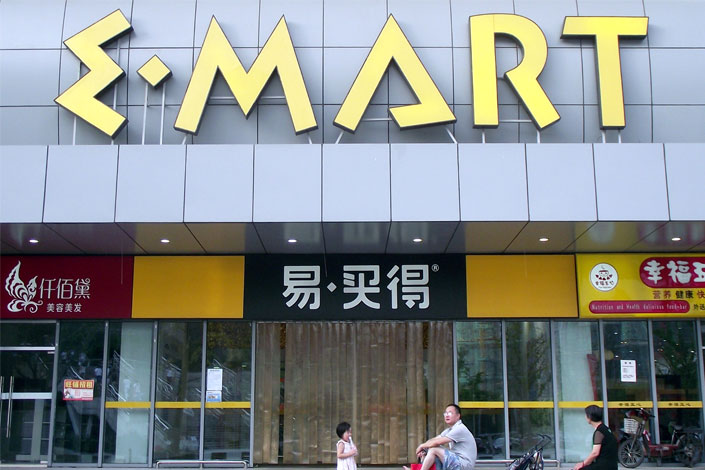South Korea’s E-Mart Reportedly to Close Its Six China Stores Amid Missile Spat

(Beijing) — South Korean supermarket and general merchandise retailer E-Mart Inc. will reportedly close its six outlets on the Chinese mainland amid mounting losses and rising anti-South Korea sentiments in the country.
E-Mart will shutter all the outlets by the end of the year, an unidentified company official said, according to South Korea’s Yonhap News Agency.
E-Mart officials did not reply to a Caixin request for information. Workers at five China stores contacted by Caixin said they hadn’t been told about closures.
The Yonhap report did not say whether E-Mart planned any changes to its online retail operations in China.
E-Mart, which opened its first China store in 1996, has been scaling back its presence on the mainland due to weak sales since peaking at 26 outlets in 2010.
Meanwhile, Chinese shoppers in recent months have turned against South Korean companies to protest its neighbor’s deployment of a U.S. anti-missile system called Terminal High Altitude Area Defense (THAAD) — a move the Chinese government strongly opposes.
South Korean retailer Lotte Group, which provided a golf course it owned for THAAD, was the first company stung by the Chinese reaction to the system, which Beijing says can be used for spying.
Lotte has closed most of its 99 Lotte Marts in China in recent months, while its online stores on the Tmall and JD.com platforms have disappeared.
E-Mart reported losing a combined 170 billion won ($150 million) over the past five years in China and had “considered exiting China” in 2014, the company said in an earnings report, explaining “the China businesses of top global retailers suffer while local retailers dominate the China retail market.”
Global retailers such as Tesco, Best Buy, and Marks & Spencer have also shuttered China stores over the past three years.
E-Mart started riding the e-commerce tide in 2015 by launching an online store on Alibaba’s Tmall and cooperating with the platform Kaola, owned by NetEase.
Nevertheless, the company’s China sales continued slipping. Although E-Mart reported higher sales in non-China business areas last year compared to 2015, it said China sales fell 21% to 168 billion won.
“Supermarkets are on a decline in the retail industry, as falling sales and widening losses are common now,” said Zhou Yong, a professor at Shanghai Business School and director of the research team for retail information provider LinkShop.
Supermarket chains have started shifting their focus, some by opening smaller convenience stores, some by delivering fresh groceries to homes launching groceries in residential areas, and some by expanding into small cities, Zhou said.
And some, like E-Mart, have simply quit, Zhou said.
E-Mart is also adjusting at home by, for example, moving cautiously to open brick-and-mortar stores. Last year, it launched only one shop in South Korea compared with 19 in 2006.
Contact reporter Coco Feng (renkefeng@caixin.com)

- 1Cover Story: China Carves Out a Narrow Path for Offshore Asset Tokenization
- 2Drownings Shake Chinese Enthusiasm for Travel to Russia
- 3Over Half of China’s Provinces Cut Revenue Targets
- 4Li Ka-Shing’s Port Empire Hit by Forced Takeover Amid Panama Legal Dispute
- 5In Depth: China’s Mutual Fund Industry Faces Overhaul After a Banner 2025
- 1Power To The People: Pintec Serves A Booming Consumer Class
- 2Largest hotel group in Europe accepts UnionPay
- 3UnionPay mobile QuickPass debuts in Hong Kong
- 4UnionPay International launches premium catering privilege U Dining Collection
- 5UnionPay International’s U Plan has covered over 1600 stores overseas






